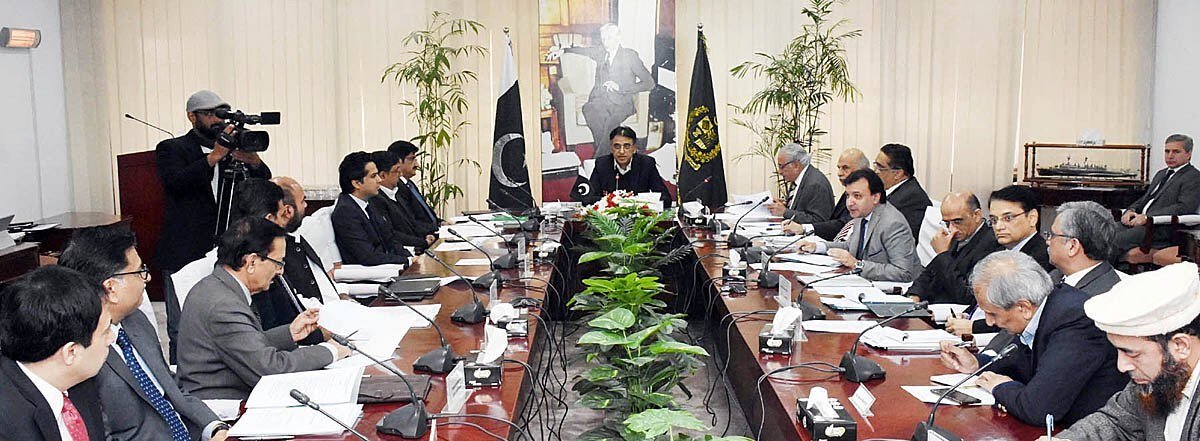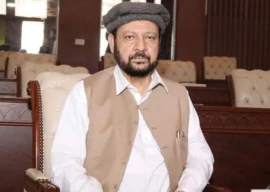
Sindh Chief Minister Syed Murad Ali Shah also sought a cut in the vertical share of the Centre to the extent of fiscal resources that the federal government was earlier spending on erstwhile Federally Administered Tribal Areas (Fata) which have now been merged with Khyber Pakhtunkhwa.
The first meeting of the reconstituted 9th NFC was chaired by Finance Minister Asad Umar in Islamabad. At the meeting, the federal government presented a weak macroeconomic picture that showed higher budget deficits due to spending on debt-servicing and defence.
The meeting decided to form the working groups to prepare reports that will be presented in the next meeting of the Commission. The NFC also agreed that the issue of vertical distribution of resources would be decided first.
It set up a working group to determine the fiscal share of FATA that would be headed by the Khyber Pakhtunkhwa government. A sub-group on ease of doing business would be led by Sindh, which would take up the issue of integration of tax collection.
Another sub group on straight transfers and horizontal distribution of resources would be led by Balochistan and the vertical distribution of resources working group will be chaired by the federal government.
Under the Constitution, the NFC is a nine-member body, comprising five finance ministers and four technical members, one from each province however, this time federal finance secretary has been included as the 10th member. The Sindh government has put a question mark on the legal status of the commission, objecting to the inclusion of federal finance secretary.
"It is required to enlighten this office, as to the legality of including an official expert who happened to be federal finance secretary and as such represents the federal government," the Sindh finance department had said in a letter to the federal finance ministry last week.
After the meeting, the Sindh Chief Minister Murad Ali Shah pointed out that the results of the 6th population census had not been approved by the Council of Common Interests (CCI) yet, therefore the matter of redistribution of horizontal shares of the provinces under the new population results cannot be discussed at this stage.
The 6th census showed the country's population at 207.74 million but it has not yet been approved by the CCI due to objections raised by Sindh. The Statistics Division has sent a summary to the Prime Minister about the fate of the population census but the matter remains pending.
Finance Minister Asad Umar assured the provinces that the 18th Constitutional Amendment was a step in right direction, Murad Shah said. He added that there was no discussion on a single tax authority but a group was formed to address the issue of duplication of resources.
Umar said that there was a huge responsibility on all participants to address the need for mobilising resources, incentivising priority sector spending and making tax system easer for doing business.
"Until resources are not increased, neither the provinces nor the Centre can achieve its targets", said Asad Umar. He added that it was also agreed that the provincial governments would be involved in negotiations with the International Monetary Fund (IMF) on fiscal matters.
The meeting included a detailed presentation by the federal finance secretary on the country's overall fiscal position. Similarly, provincial representatives also gave briefings on the financial position of their respective provinces. It was decided that the NFC would now hold meetings after every six weeks and the next meeting would be held in Lahore.
During the meeting, the provincial governments also raised concerns over the low-tax collection by the Federal Board of Revenue (FBR) that faced Rs191 billion shortfall in revenues. Shah protested that Sindh received Rs60 billion less than its share during the seven months of the fiscal year.
Responding to a question, the Sindh chief minister said that Fata was the responsibility of the federal government and when it was merged with the K-P, the fiscal resources should be given to the K-P government from the vertical share of the Centre," he added.
At present, Centre gets 42.5% from the divisible pool and the rest is distributed among the provinces on the basis of multiple criteria of population, revenue generation, inverse population density and poverty.
The federal government cannot throw the responsibility of lack of development in Fata on the shoulders of the provinces, said the chief minister. It was decided in the meeting that the Fata sub-group would analyse the issue of merger of the tribal areas with K-P.
Responding to another question, Shah said that the multiple criteria for horizontal distribution of resources had been adopted in the last NFC and small changes could be made in the horizontal distribution.
He added that the sales tax collection on goods should be handed over to the provinces to improve its collection. During the past five years, the growth in sales tax on services collection was 26%, which was double than the growth registered in tax collection on goods, said the chief minister.
Punjab Finance Minister Hashim Jawan Bakht said that the NFC discussions were held in a conducive environment. He added that structural issues being faced by the national economy should be handled as a federation.
The minister said that Punjab took Rs70 billion hit on its revenues in first seven months, including less transfers from the provinces. "Provinces should focus on generating their own resources and those provinces should be incentivised in horizontal distribution of resources that show better growth in revenue, he suggested.
Sindh's technical member Asad Sayyed said that the provinces showed concerns over low-tax collection by the FBR, also sought a role in FBR's policy formulation.
Punjab's technical member Dr Salman Shah said that the main issue was the overall expenditures of the federal and provincial governments. He said that the federal government raised the issue of circular debt and its implications on overall debt financing. He said that the issue of state-owned enterprises losses have to be tackled by someone.

1722586547-0/Untitled-design-(73)1722586547-0-165x106.webp)


1732326457-0/prime-(1)1732326457-0-165x106.webp)












COMMENTS
Comments are moderated and generally will be posted if they are on-topic and not abusive.
For more information, please see our Comments FAQ